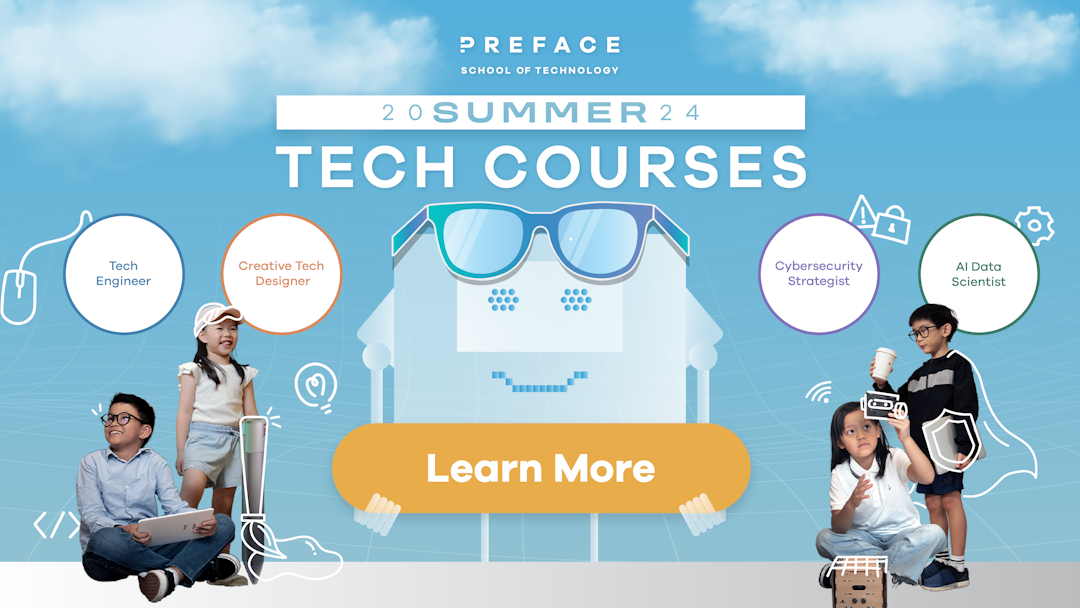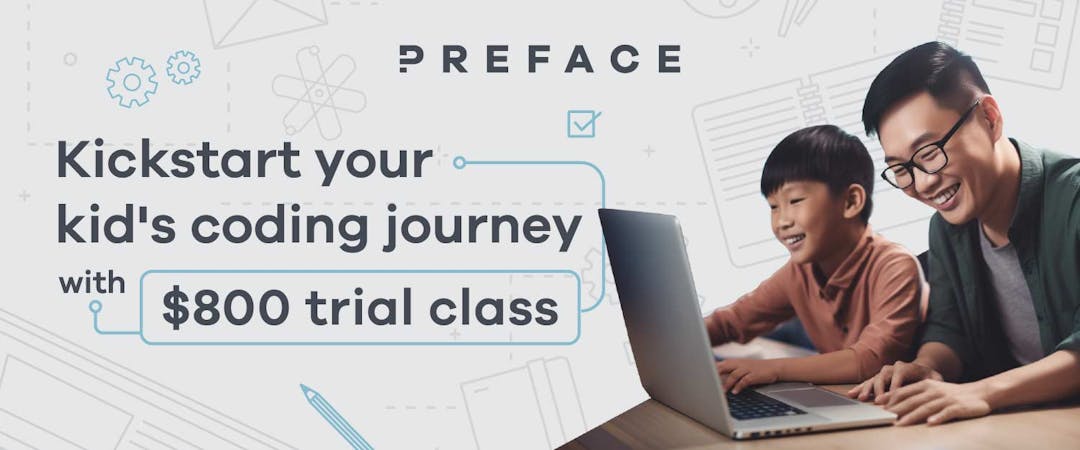
Living in today’s hyper-competitive era, parents are more concerned about their children falling behind expectations. As a matter of fact, many have started planning for early childhood education long before their baby is born. For those who want to ensure a solid and broad foundation for your kids, Preface is going to answer the most common questions about early childhood education below. Let’s learn!
What is early childhood education?

Early childhood education (ECE) refers to the educational programs tailor-made for children aged 0 to 5, who are currently in their preschool years.
Broadly speaking, early childhood education consists of a wide variety of activities and experiences which are designed to promote children’s cognitive and social development.
To better engage young children in learning, early childhood education programs seek to combine the following common approaches:
1. Playful
Instead of making the students sit still in a standard classroom, the early childhood education programs allow children to enjoy the freedom to innovate and enact new possibilities. During playtime, children can also learn essential skills such as problem-solving, team working, communication and more.
2. Age-appropriate
Abundant research has shown that learning styles and abilities are age-related. That’s why early childhood education needs to adapt seamlessly to the learners’ level of understanding, as well as to identify the readiness of a child so as to offer the best-suited teaching method.
3. Language Rich
Children learn a language at a phenomenal rate during their early years, therefore, intending to expand their vocabulary, early childhood educators put great effort into creating a language-rich learning environment through meaningful dialogues.
4. Active
An active learning environment encourages children to move, do and interact appropriately in a range of learning situations, the facilities such as chairs and tables are also specifically designed for small-group work, allowing students to engage in both physical and embodied studies.
Read more:The Ultimate Guide for Kids’ Python LearningThe Ultimate Guide for Artificial Intelligence (AI) for KidsThe Ultimate Guide: STEM Education for KidsThe Ultimate Guide for Kids Coding Class
Purposes of early childhood education

Early childhood education is so popular for several reasons, including but not limited to:
1. Create a nurturing environment
The environment can literally determine a child’s future as stated by many professionals. If the environment is encouraging and caring, children growing up in such an atmosphere normally feel safer, and therefore more willing to do their own investigation and exploration.
2. Develop social skills
Communication is always the key, however, it might take a lifetime to master. It is thus of utmost importance for parents to start teaching their children how to socialise and cooperate with peers effectively as soon as possible. According to the Japanese educational guidelines, the purpose of early childhood education is to guide children to develop these basic human attributes rather than to teach them academic skills.
3. Teach self-control
Compared to older kids, toddlers are usually with poorer self-regulation skills. But age is definitely not an excuse for acting purely on impulse, and early childhood education programs can help children to learn how to make appropriate decisions and respond to stressful situations in ways that can yield positive outcomes through well-structured courses.
4. Build self-esteem
Self-confidence can start as early as babyhood. When children feel proud of themselves, they are more likely to succeed in school and achieve personal goals in the future. By giving students limitless opportunities to explore new horizons and take on new challenges, children are actually having more chances for self-esteem to grow.
5. Foster language literacy skills
Language and literacy skills can be developed in early childhood, and early childhood educators play an important role in modelling good oral language during these critical years. By engaging in meaningful conversations frequently, students can quickly learn about the language as well as the written words, and start using more advanced sentence structures in the twinkling of an eye.
Want to keep up with the tech-driven future? Check out Preface Coding Event for our latest Tech Seminars and Coding Workshops to stay relevant! Come enjoy the exquisite beverage selection from Preface Coffee & Wine while updating yourself with the most up-to-date knowledge!
Why is early childhood education important?

The reputed parent educator and family counsellor Dorothy Law Nolte has once said that, “Children do learn what they live. Then they grow up to live what they’ve learnt.”
Doubtless, having positive experiences in early childhood is truly beneficial to future development, whereas on the other hand, negative experiences such as being isolated and neglected can bring serious damage to a child in many different ways.
Therefore, giving children a supportive learning environment can help to lay a solid foundation for learning and career success.
Unfortunately, the majority of parents might not know how to correctly support their child’s early childhood education. As said by the Duchess of Cambridge, “parenthood isn’t a prerequisite for understanding the importance of the early years.” That’s why professional early childhood education means so much to this group of people.
The early childhood education system comes with various unsurpassable uniqueness. For example, in Japan, students are taught to be independent and caring through interactive activities such as sports, arts and crafts rather than plain explanation and memorisation, which are highly systematic and organised.
Source: ResearchGate, NSW Government, FE News
Early childhood education in Hong Kong

Hong Kong has one of the finest education systems across the globe. To ensure schools can offer high-quality education and training, the government has announced that all newly appointed kindergarten principals are required to obtain a degree in early childhood education (ECE) since 2009.
There are currently more than 1,000 kindergartens and nurseries for children who are not old enough to enter primary schools, each must attain the teacher-to-pupil ratio at 1:15 or lower, and all of them are privately run by either enterprises or non-profit organisations.
With reference to the Education Bureau, the early childhood education programs should be able to help children achieve an all-round development by fulfilling the following 5 objectives:
Moral Development
Cognitive and Language Development
Physical Development
Affective and Social Development
Aesthetic Development
Source: CUHK, South China Morning Post
How to choose an ECE Program?

1. Anti-bias curriculum
To create a safe and supportive learning community for every child, the teachers should be able to offer a sense of fairness and justice, allowing students to feel strong and proud without needing to feel superior to anyone else. Through well-designed lessons, children should understand, accept and respect various ethnicity, family structure, religion, family and cultural traditions represented in the classroom.
2. Physical environment
It is a well-known fact that children love to play, therefore the overall design and layout of the classrooms and learning centres should be ample enough for children to work and play independently or in small groups. For instance, classrooms can adopt informal furniture arrangements where students can sit on soft chairs and pillows, or even on the carpet, offering opportunities for children to move around freely.
3. Professional teaching workforce
A highly-qualified early childhood educator is crucial to a high-quality early learning experience. Therefore, parents must check carefully if the teaching team is equipped with professional knowledge and experience to lead activities that promote children’s learning at various ages.
4. Computer Technology
It will be a huge bonus if children are provided with opportunities to engage in technology-related activities. The world is now actively shifting towards digitisation, to survive and thrive, children need to become native digital citizens. The teachers should thus offer concrete learning centre activities related to software programs, also to inform their students how to use technology in everyday life.
5. Family involvement
A comprehensive early childhood education program should recognise the importance of parental involvement in school activities. Parents are the children’s very first teachers and have a powerful impact on their young children’s development. By encouraging families to participate in their child’s learning process, not only can the children feel supportive and motivated, but the teachers can also know more about the unique strengths and talents of each student, achieving a win-win outcome.
Source: University of Massachusetts Global, New Zealand Tertiary College, The Center for American Progress
Source: University of Massachusetts Global, New Zealand Tertiary College, The Center for American Progress






